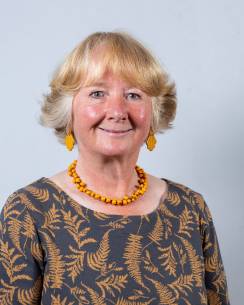Making change happen as a Board member at Community Justice Scotland
Glenys Watt has been a Board member since Community Justice Scotland launched in 2017 – and now she’s set to retire at the beginning of the new year, she’s reflecting on her time in post and encouraging others to consider applying for one of four upcoming positions

Community Justice Scotland’s (CJS) mission for a community first approach is close to my heart. Prison doesn’t work for the majority of people, it doesn’t stop people re-offending and it breaks up families, damaging children for the next generation. I agree with Churchill’s view that the best principle for a prison system should be “to prevent as many people as possible from getting there”. Prison should be kept for those who are a serious threat to the public.
CJS promotes better understanding of the benefits and value of sentences in the community, drives improvement in the justice system and supports those delivering services which lead to reduced offending and fewer victims of crime. The evidence shows that sentences served in the community are more effective than those served in prison. It’s about getting this message to the public, politicians and the media as well as justice professionals so they can consider alternatives to custody and use community sentencing wherever appropriate. It is complex and demanding work.
The Board is made up of committed individuals who all want to help CJS succeed in this task. Our role is to help deliver the aims of the National Strategy for Community Justice, to support our staff as they work to achieve that with partners across Scotland and to ensure good governance of the organisation in terms of its finances, risk management and human resources. Getting the balance right between support and helpful challenge is the art of good governance.
One of the essential elements for an effective Board is to have a mixture of talents, backgrounds and life experiences involved.
Everybody who is committed to the main task of what CJS is trying to achieve will have something to offer. If you have had direct experience of the justice system, either yourself or through a family member, you understand what it feels like and where it falls down – knowledge that could be invaluable to the Board. If you have served as part of the justice system in a professional capacity you will again have a perspective that adds to the discussions that take place round the Board table (or online). Also importantly if you come from a group that is under-represented on Boards generally (care experienced, disabled, LGBTQ+, from ethnic minority communities, aged under 50) your contributions will add something different and important.
I have really enjoyed being part of CJS and working with my Board colleagues and CJS’s very committed staff. It’s been a highly interesting role.
For me there is always the challenge that change does not come as fast as I would like.
Progress involving so many partners involved in the delivery of justice is necessarily incremental. At times it can feel like turning a huge ship around in a turbulent sea!
For example, the first day I joined we talked about the need for the system to reduce the high numbers kept in custody on remand awaiting trial, many of whom pose no risk to the public and a significant percentage of whom will be found not guilty. We provided evidence which contributed to Parliament passing the Bail and Release from Custody (Scotland) Act in August 2023. It will change how courts consider who can be granted bail. But it has not yet been brought into force and Scotland still has too many kept on remand seven years later.. so I hope that the new Board members will work to ensure that the justice system successfully introduces the changes contained in that Act and will continue to advocate for Scotland to bring in, as quickly as possible, further much needed improvements across the justice system.
- Find out more about becoming a Board member and apply here
